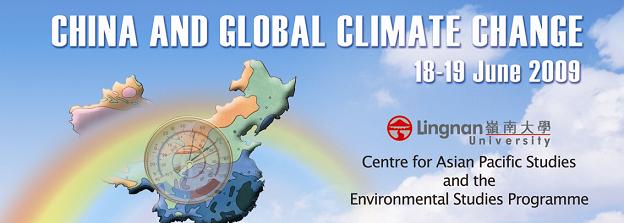
Event Title
Conference on China and Global Climate Change : Reconciling International Fairness and Protection of the Atmospheric Commons
Location
AM308, Lingnan University
Start Date
18-6-2009 2:00 PM
End Date
18-6-2009 3:30 PM
Language
English
Description
If the US and EU agree to stringent emission targets in a post-Kyoto successor agreement but China does not, would carbon tariffs on Chinese imports be justified? A dominant view of climate justice affirms the 'polluter pays principle' as the most appropriate distributive principle for allocating the costs of mitigating climate change and asserts that carbon tariffs on developing world imports are unjust. Against this widely accepted standard of justice this paper defends the appropriateness of more pragmatic climate norms. In particular the paper defends a forward-looking 'non-cooperator pays' principle which states that under the condition of anarchy, actors negotiating to secure a public good that cannot be provided without wide-spread cooperation are justified in seeking to induce cooperation by imposing costs on non-cooperators, even if this cost-allocation would be considered unjust in the absence of the collective action problem. This principle’s most likely application would be in the form of border tax adjustments (or carbon tariffs) that equalise the embodied cost of greenhouse gas emissions on imports and exports. This position is contextualised within a broader argument that the climate regime’s norm of ‘common but differentiated responsibility’ is a barrier to the creation of an effective international climate agreement. Taking the interests of the most vulnerable climate victims seriously may require us to move beyond existing conceptions of inter-state justice and to accept that the distribution of costs under a climate agreement that is both effective and politically viable may not reflect historical responsibility.
Document Type
Presentation
Recommended Citation
Symons, J. (2009). The non-cooperator pays principle: Pragmatic norms and the US-China mitigation standoff. In China and global climate change: Proceedings of the conference held at Lingnan University, Hong Kong, 18-19 June 2009 (pp. 173-190). Centre for Asian Pacific Studies and the Environmental Studies Programme, Lingnan University, Hong Kong.
Included in
The non-cooperator pays principle : pragmatic norms and the US-China mitigation standoff
AM308, Lingnan University
If the US and EU agree to stringent emission targets in a post-Kyoto successor agreement but China does not, would carbon tariffs on Chinese imports be justified? A dominant view of climate justice affirms the 'polluter pays principle' as the most appropriate distributive principle for allocating the costs of mitigating climate change and asserts that carbon tariffs on developing world imports are unjust. Against this widely accepted standard of justice this paper defends the appropriateness of more pragmatic climate norms. In particular the paper defends a forward-looking 'non-cooperator pays' principle which states that under the condition of anarchy, actors negotiating to secure a public good that cannot be provided without wide-spread cooperation are justified in seeking to induce cooperation by imposing costs on non-cooperators, even if this cost-allocation would be considered unjust in the absence of the collective action problem. This principle’s most likely application would be in the form of border tax adjustments (or carbon tariffs) that equalise the embodied cost of greenhouse gas emissions on imports and exports. This position is contextualised within a broader argument that the climate regime’s norm of ‘common but differentiated responsibility’ is a barrier to the creation of an effective international climate agreement. Taking the interests of the most vulnerable climate victims seriously may require us to move beyond existing conceptions of inter-state justice and to accept that the distribution of costs under a climate agreement that is both effective and politically viable may not reflect historical responsibility.

